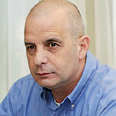
Diskin: Gaza could become Lebanon
Shin Bet chief warns government from intensification of terrorism in Gaza: 'This is a strategic problem. The Philadelphi Route is breached, tons of explosives have been smuggled in recently. We don't have to wait three years and investigate'
Diskin said that the "Philadelphi Route is breached, and recently a number of tons of explosives and hundreds of weapons have entered. Recently, USD 1.5 million has been smuggled in through Rafah by the Hamas Agriculture Ministry, and terror experts have also entered."
The Shin Bet chief recommended reviewing all agreements on the passages, which he said "are ineffective in actuality under Egyptian monitoring."
"In Judea and Samaria Hizbullah is smuggling in money in large sums and encouraging terrorist attacks against Israel. Nasrallah is perceived as a national hero among terror organizations, and they are attempting to learn from him. They understand the power of the antitank missile and guerilla fighting, as using underground bunkers," said Diskin.
Regarding the internal Palestinian situation, Diskin said that "Fatah's situation is very serious. It hasn't been in such a low ebb since its formation. If positive things from its perspective don't happen soon, chances are good that Fatah in Gaza will crumble and disappear. The only refuge, the Preventative Security force, crashed under Hamas pressure – Hamas is kidnapping members of the force every week."
"Members of the Preventative Security force feel that they are not backed by Mahmoud Abbas and the party, their morale is down and they are looking for a way to reach coexistence with Hamas. The war in the north and internal processes in Palestinian society are preventing Abbas from offering that 'last recommendation' of which we have been hearing about for a number weeks, based on national Palestinian unity, ending of rocket fire, a calming down period – Tahadiya – and a solution to the kidnapped soldier issue. There is an agreement on the suggestion in theory only, because a number of factions haven't agreed. There is also a drop in the number of Qassam rockets, but this is characteristic of a period when there is dialogue between the factions," added Diskin.
The Shin Bet chief said 49 ministers have been arrested up to now, including members of parliament and senior Hamas members. Four of the ministers have been released, one is still being interrogated, and an indictment sheet is being prepared against another.
Halutz: Over 500 Hizbullah members killed
IDF Chief of Staff Dan Halutz said "Israel entered a staged application of the ceasefire, which is not total. Hizbullah is keeping the ceasefire, keeping a low profile, and not appearing on the ground with arms and uniform. The deployment of the Lebanese army is taking place along the agreed lines."
The chief of staff said that "in Lebanon after the war they are doing some soul seeking, among many of the Shiite population there is a feeling of loss. Nasrallah is being portrayed as the destroyer of Lebanon more than as its savior. Siniora is trying to apply the components of Resolution 1701 without reaching a clash with Hizbullah. 1,500 Lebanese army soldiers have gone to the south, with 50 tanks and 100 armored vehicles."
Halutz said that the IDF believed "Hizbullah took a heavy blow, in its operation infrastructure and fighters. Its status in Lebanon has been eroded. The number of terrorists killed up to now is definitely over 500 and it's expected to rise after searches of all the areas are conducted. The IDF attacked ten thousand Hizbullah targets, including logistical infrastructures and command posts. Hizbullah was strong during the fighting to its credit, but the damage it sustained was expressed by its unequivocal call for a ceasefire."










